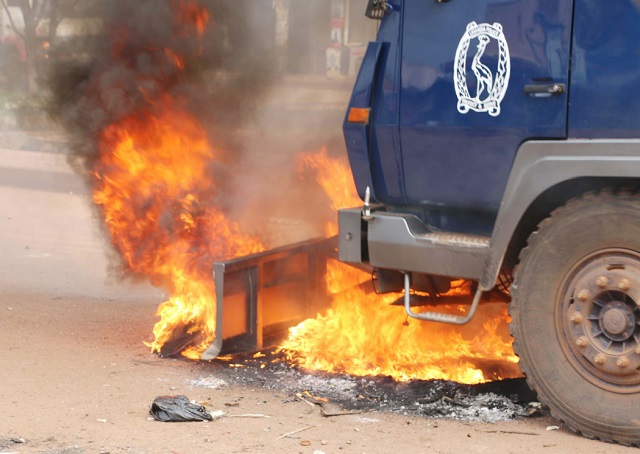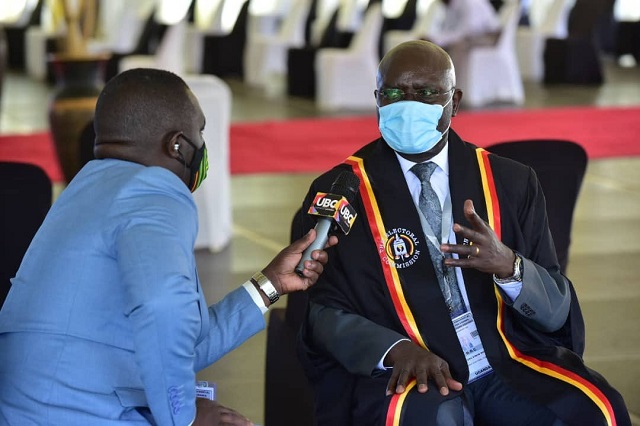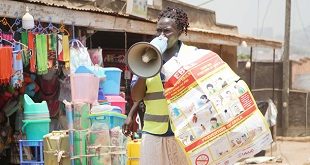
Why it is wrong to use public health emergencies for political gain
Kampala, Uganda | RONALD MUSOKE | The Electoral Commission is facing a big test to build public confidence over alleged failure to take charge of the electoral process as several presidential aspirants constantly face harassment in the hands of security personnel on claims of violating guidelines for containing the coronavirus pandemic during the ongoing campaigns.
Security personnel arrested the Forum for Democratic Change’s candidate, Patrick Oboi Amuriat, and the National Unity Platform’s Kyagulanyi Robert Ssentamu aka Bobi Wine, on Nov.18, triggering protests in various parts of the country – Kampala, Mukono, Masaka, Jinja, Iganga, Bugiri, Busia and Mbale among others. More than 16 people were shot dead by security personnel and left hundreds nursing injuries.
However the EC, which is mandated to take care of the candidates, only issued a statement on the evening of the next day following a backlash from the public. While Amuriat was released on the day of arrest, Kyagulanyi was released on a court bail on Nov. 20.
Kyagulanyi’s detention had prompted various stakeholders to call for suspension of the presidential campaign with many arguing that it is difficult to carry out a hybrid election in the middle of the pandemic.
“The incidents of violence at hand in different parts of the country points to one thing: that as a country we have failed the test of hybrid elections amidst the COVID-19 pandemic,” Crispy Kaheru, an election expert told The Independent.
“It is therefore prudent that the EC suspends physical campaigns with immediate effect until such a point when the body regains full control of the electoral environment. Life is more important that elections…an electoral process that is not peaceful may ultimately be difficult to prove as credible.”

Nicholas Opiyo, the executive director of Chapter Four, a Kampala-based civil liberties organization said in a tweet that the logical thing to do is to “halt this charade of a campaign process; recall the candidates and agree on a modus operandi for what is left of the process; and most importantly, ask the EC to either take control of the process or save us the time and resources and declare the predetermined winner.”
The Inter-Religious Council of Uganda (IRCU), an indigenous, national faith-based organization has called upon the EC and the various security organs to adhere to the human rights principals enshrined in national constitution.
The religious leaders have also accused the UPDF of breaching Article 209 that states that the army will cooperate with civilian authority in emergency situations and in cases of natural disaster like COVID-19.
“We noted with concern that the police were in breach of the COVID-19 SOPs and of Article 21(3) that stipulates that the police shall be patriotic, professional, disciplined, competent and productive,” IRCU said adding that security personels should uphold the Ugandan constitution and all relevant laws and ought to treat all citizens of Uganda fairly and equally irrespective of their political affiliation.
For Perry Aritua, the executive director of the Women’s Democracy Network, a Kampala-based civil society organization, the EC should take charge of the electoral process.
“The EC is in charge of organizing and supervising the elections in this country but from what we have seen so far, this has been lacking,” she told The Independent. She also wants the EC to improve the flow of information to Ugandans.
Aritua points to some of the resolutions the EC has reached with the presidential candidates but have only been posted to the EC website. She says the EC must know that not every Ugandan owns a smartphone and is able to access the internet.
“The EC must step up its role as the arbiter in this election; it must be seen to be in charge of the electoral process. Information must only go to the public via social media platforms; let them utilize the traditional media as well,” she said.
“Citizens are pained that their candidates are not being allowed to campaign freely but they too must be made aware about the pandemic and they must take responsibility for their lives,” she added.
Moses Mulumba, the executive director of the Centre for Health and Human Rights (CEHURD) told The Independent on Nov. 19 that what is going on in Uganda is “sad and unacceptable.” Mulumba said it is wrong for public health emergencies to be used for political gain.
Mulumba told The Independent that all the political players should see the current situation beyond COVID-19.
“No matter what, the decisions reached need to be negotiated” he said adding that implementing the COVID-19 SOPs forcefully makes the situation worse.
 The Independent Uganda: You get the Truth we Pay the Price
The Independent Uganda: You get the Truth we Pay the Price



